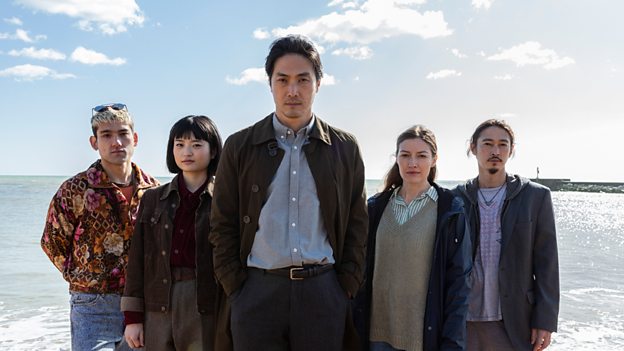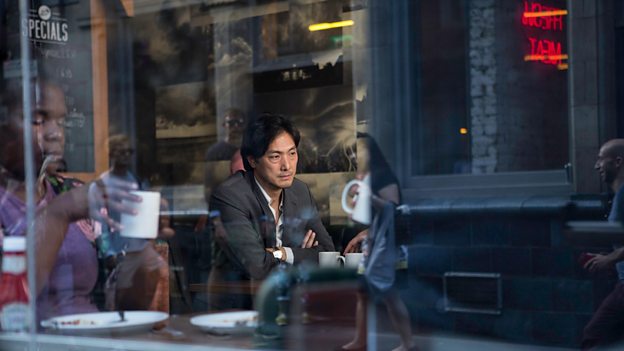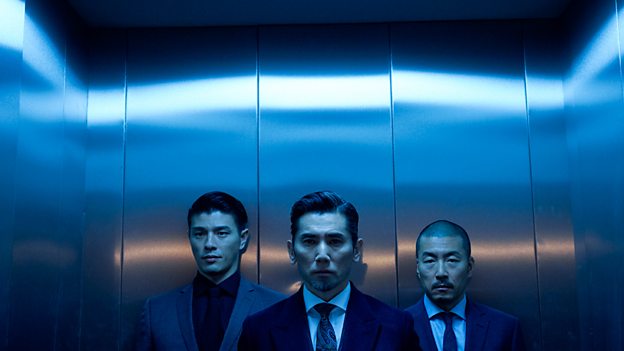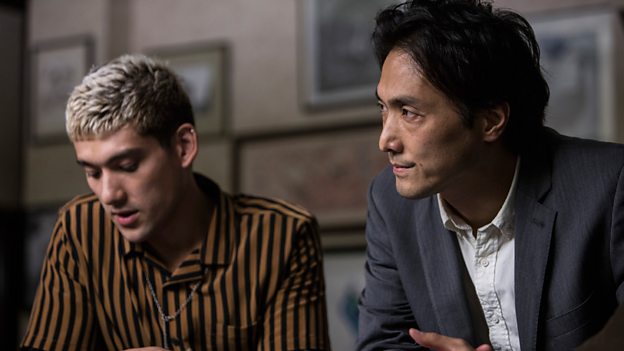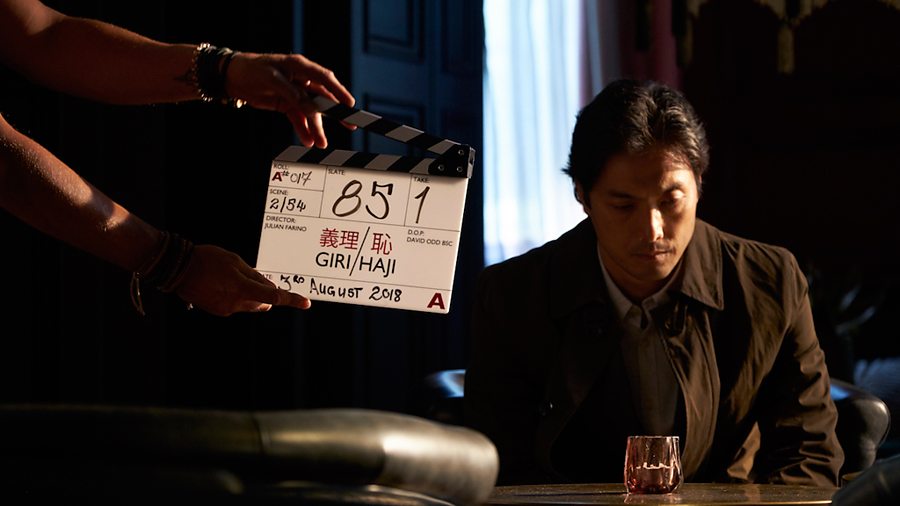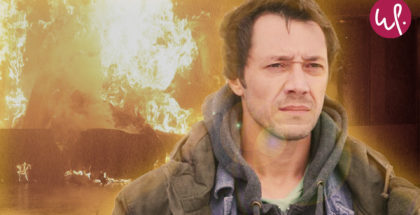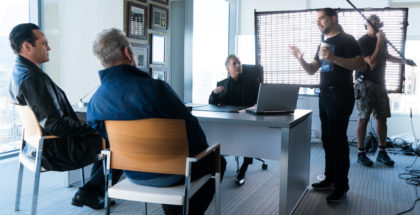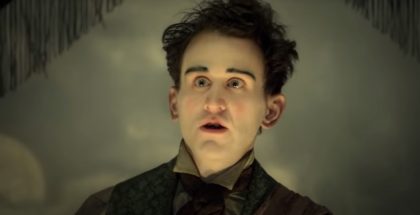Interview: Joe Barton talks Giri/Haji, bridging two cultures and box set binges
David Farnor | On 16, Oct 2019
This Thursday sees the premiere of a new UK series that’s unlike anything you’ve seen before on British TV. Giri/Haji explores the butterfly effect of one murder over the cities of London and Tokyo, as a world-weary detective, Kenzo (Takehiro Hira) heads to London to find out what happened to his brother, Yuto (Yosuke Kubosuka). There, he crosses paths with a young British-Japanese rent boy (Will Sharpe), Met detective Sarah (Kelly Macdonald) and a whole host of gangsters.
Explring the consequences of one violent split-second decision, the result is part romantic drama, part tale of family loyalty and betrayal, part action thriller, part detective procedural and all wholly unique. From the opening 25 minutes, which are entirely in Japanese to the epic visuals that juggle different times, places and tones, the eight-part series is as novel as it is literary in scope.
It’s hard to believe, then, that it started in such an inconspicuous manner, with Joe Barton (iBoy, The Ritual, Humans) scribbling down something a former girlfriend had mentioned: a mysterious Japanese figure who was attending her forensics class.
“I just sort of stole that,” he explains to us. “There was kind of a reverse Lost in Translation vibe and I thought there something in it. It took a couple of years to find properly, you know, a story.”
That was enough to interest producer Jane Featherstone, though, who asked him to flesh it out into something more substantial.
“I think it was literally just ‘Japanese detective comes to London. Maybe finds his brother?’ Luckily, she saw something in that or just really wanted a trip to Japan!” recalls Joe.
“It was surprising, actually. I think there was another idea which I thought she’d go for. I just pitched four or five at the time and you never know. I’ve given up trying to predict what execs are going to be excited about. And I was pleased, because I’ve always loved the idea, and I was really happy she was interested in it – nobody else had been!”
The result is a gangster saga, but one that blends genres as much as it does cultures. We spend as much time learning about Sarah’s and Kenzo’s personal problems as we do piecing together the mystery of his brother.
“I think I set out doing it as more of a crime genre piece,” Joe explains. “I was given a long time to write it, about a year, and over the process of writing, I think I became more interested in the characters and relationships than I necessarily was in the procedural elements. For me, anyway, when I write, that stuff is more interesting to me.”
“Writing is basically like free therapy for me…”
Write what you know is the old adage, and Joe stuck to it as the drama began to take shape.
“Writing is basically like free therapy for me,” he jokes, “so you look for the things the characters resemble from your own life and the idea of this guy whose marriage was failing and has gone to London and met someone new… These all slightly mirrored my life – I’d just come out of a long-term relationship and I’d moved back to London and met someone else and that didn’t work out. There were all these mirrored elements and I was much more interested in that, because it was more closely aligned to my experiences. And also, plot is very difficult! Some writers, like Jed Mercurio, are brilliant are writing these intricate plots with people finding stuff and tracking people down and it always makes my head hurt a little bit!”
There is a fair share of action to blow your socks off – most notably a shootout in Episode 4 – but Joe says that the plan was always to avoid that being the starting point or the finale.
“I slightly conceived it in two halves, in a way,” he says. “There’s this shootout and then episodes five to eight are the aftermath of that. I’ve always wanted to do that, one of my early ideas was a show with a 20-minute gunfight because I thought it’d be fun.”
“It made sense to do it halfway,” he adds. “The opening we’ve got, we wanted it to be punchy and grab people, especially because in the first 25 minutes, the show is all subtitled. But it’s not, like, a massive set piece. But I think you have to build to those things, you have to be invested in the characters. And also, because of the human drama, I didn’t want it to be the end of the series – that wouldn’t be an emotional ending, it would be a physical ending.”
If writing what you know is the secret to storytelling, though, Giri/Haji is remarkable because of how much it sees Barton depart from his own experiences. Neither Japanese nor a member of the yakuza, the story’s focus on Tokyo’s underworld is a bold leap. Was it a scary one too?
“Yeah, I mean, you always worry. You always worry about everything! But when you’re writing another culture, you want to get it right. All the feedback we’ve had from our Japanese cast and crew is that it’s authentic, but you’re still nervous for it to come out and for people to respond to it.”
“The thing about Japanese culture was how many similarities there were.”
The cast in the show all say that it was impressive how much Joe got right. There were, of course, things to learn – Joe had a whole team of researchers and translators – such as swearing, which is much less common in Japan than in UK culture. The concept of duty (“giri”), however, and the notion of how shameful it is to break that contract, is something that is easy to relate to from the perspective of ultra-polite Brits.
Indeed, Joe’s reserve Lost in Translation description is extremely apt, with the series never resorting to easy culture-clash jokes or fish-out-of-water moments.
“It’s about finding the things that are similar,” Joe reflects. “The thing about Japanese culture was how many similarities there were, and how that comes across. In some ways, we’re so vastly different, it’s fun to find the things that are similar. Ideas about behaviour, how people see you, politeness, the front that we put on, all this stuff, island nations that are fading and stuff.”
Even the way director Julian Farino portrays Tokyo – muted browns and greys, rather than the neon skyline we’re used to – is key to the feeling of familiarity.
“It was interesting going to Tokyo, because when you see it on screen, or you see documentaries, you see lots of flashing lights, but when you get out of the city, it’s vast and enormous and the suburbs don’t feel all that different to other cities,” explains Joe. “It could be Madrid in some places, London in some places, all these different bits of it. I was fascinated by how different and how similar it felt.”
As for the yakuza element, Japanese society is as clueless as Joe is, with the crime world hidden to the point where everyone bases their understanding of it on the films and shows they see. Japanese films and TV series, however, have a very different style of acting to British dramas, with casting director Yôko Narahashi working to find Japanese actors who could play scenes in an understated, naturalistic style. With the Japanese cast members so prepared that they barely fluffed any of their lines, however, the bigger challenge was simply getting permission to film in Tokyo, where etiquette dictates the every single person affected by the shooting has to give their permission.
“Creatively there weren’t any shackles, so we could do what we wanted.”
One key to the balance of British and Japanese culture is the casting of Will Sharpe as sex worker Rodney.
“A Japanese-British, handsome, funny guy. We thought that’d be hard to find,” admits Joe. “There are loads of amazing Japanese actors, but they may not necessarily be able to do a British accent. It was always in the back of our heads that it might be tricky.”
Jane, however, knew Will from his show Flowers, and reached out to get him on board.
“He was probably literally next door at the time,” laughs Joe. “And I’d met Will at some social events or something briefly, and loved Flowers. He was the actor I was most nervous about meeting because he’s such an amazing writer, but he’s amazing. He elevated the material!”
The other vital ingredient is Julian’s visuals, which manage to jump from distinctive portrayals of London and Tokyo to cinematic flashbacks with an ultra-widescreen aspect ratio – and impressionistic, atmospheric animations made by the company by Hey Duggee.
“Julian and our DoP worked hard to find what the right look was,” explains Joe. “We were very keen to avoid shooting Tokyo in the way – you know when you see London and it’s all Buckingham Palace… it’s not really authentic. We wanted to film Tokyo in an authentic way and wanted it to be really cinematic and epic. It was just a case of finding the right colour schemes and the right lenses for the modern story and we wanted the flashbacks to stand out.”
“Part of it was just a sense that creatively there weren’t any shackles, so we were allowed to do what we wanted,” he adds.
Indeed, the show is backed by both the BBC and Netflix, with each one keen to create unique, standout shows that can grab an audience’s attention in a competitive, busy online arena. Giri/Haji, which premieres on BBC Two in the UK, will be released all-at-once on BBC iPlayer alongside its first episode’s broadcast. What does Joe make of the bingeing box set model?
“I think it’s part of the current TV landscape,” he says. “I’m really happy it’s still going out every week, but it’s great that it’s available for people who want to binge it in that way. I did a film that was in cinemas and did really badly and it went on Netflix and suddenly loads of people liked it and watched it, so I think there is something to being available when people want it. That’s how people watch things now. You get shows like Bodyguard that became a real thing, with everyone watching it every week, but the BBC is careful about the things they do box set releases for and the things they don’t, things like Killing Eve… I think it helps, hopefully. I think it’s a real statement of support from the BBC, because that wasn’t originally the plan. They watched some of it and were like “Oh no, we want people to be able to binge it”.”
“There would be defeinitely be scope for a season two…”
Joe also watches stuff on-demand regularly.
“I like binge!” he enthuses. “Big Mouth, that’s just came out, I watched the whole season of that in a weekend. But then something like Succession that’s still every week is a nice treat. I think it depends on the show. I think Match of the Day is the main thing I watch when it’s actually on TV!”
Is it any different behind-the-scenes when it comes to working with Netflix versus the BBC or other traditional broadcasters and producers?
“For me, it’s quite similar, it works in the same way,” he says. “They have their execs, you come with your ideas, you send them a script or a treatment and you say ‘Are you interested or not?’ and you wait and see, which is all you can do. I’ve done quite a few things for Netflix now, so it’s nice, but they’ve still said no to their fair share of things, so there’s no guarantee!”
As for what’s next on Joe’s plate, he’s mostly keeping his eye on the various projects he has in development.
“I’m writing a couple of films with some really interesting people, one for Netflix, but they’re not greenlit or anything. I’ve got a show that’s looking quite likely, quite hopeful to happen, but that hasn’t been greenlit yet either…”
And what about Giri/Haji? Would Joe want to do a second season, if someone gave that the green light?
“Yeah! Definitely,” he says. “There would be defeinitely be scope for a season two and I think there’s loads of stories you could tell with these characters, but obviously it’s up to the broadcasters whether they want to do that. Once you’ve got characters you like spending time with, you can always find interesting things to do.”
“They’ve said have some ideas up your sleeve just in case,” he adds. “It’s a weird process to actively try to think of ideas, because often ideas just come to you from strange places.”
If Giri/Haji is the result of one of those gestating for a long time, whatever Joe Barton does next will be worth the wait.
Giri/Haji premieres at 9pm on BBC Two on Thursday 17th October. The full box set will be available on BBC iPlayer following Episode 1’s broadcast.


